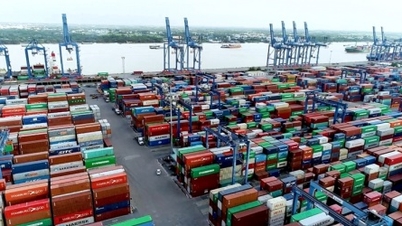
Signals from tax rates
According to information from the Ministry of Industry and Trade , early on August 1st (Vietnam time), the White House published President Donald Trump's Executive Order on adjusting reciprocal tariffs. Accordingly, the United States decided to adjust reciprocal tariffs for 69 countries and territories listed in Appendix I. Under this Appendix, the reciprocal tariff for Vietnam was reduced from 46% to 20%.
This tariff officially takes effect on August 7th, seven days after the new tax was imposed. Experts believe this tariff will have a significant impact on Vietnam's exports to the US market, Vietnam's largest trading partner. In Hung Yen province , there are currently over 500 export businesses, many of which produce textiles, footwear, building materials, electronics, and components, holding a large market share in the US. The new 20% tariff imposed by the US on goods from Vietnam is causing considerable difficulties and could slow down economic growth.

Businesses face many pressures.
In a brief exchange with us, Mr. Bui Van Son, Chairman of the Board of Directors of Long Hau Ceramic Joint Stock Company (Tien Hai Industrial Park), said: The 20% retaliatory tariff imposed by the US can be seen as a trade negotiation effort by the Government to protect businesses. However, this is still a high rate that makes it difficult for businesses exporting to the US market, especially those in sectors such as textiles and construction materials. If there is no way out, the high tariff will drive up product costs, and partners may shift orders to countries in the region with lower tariff rates than Vietnam.
Similarly, Thien Hoang – Mikado Trading and Technology Joint Stock Company (Tien Hai Industrial Park), a business that exports nearly $10 million worth of Dynamic Quartz tiles and stone products to the US market annually, is facing unprecedented difficulties. Mr. Pham Bach Tung, Chairman of the Board and General Director of the company, shared: "Previously, our goods were subject to a 10% tariff from the US. To compete and convince importing partners, we had to negotiate price reductions with a spirit of sharing the difficulties. Now, the new 20% tariff will create many more obstacles for businesses in negotiating with partners and customers; the market competitiveness of our products could be seriously affected, especially compared to cheaper Chinese goods. If the tariff increase continues, it will directly impact the company's profits and growth rate in the fourth quarter of this year."
For Greenworks Vietnam Co., Ltd. (Lien Ha Thai Industrial Park), a company specializing in manufacturing gardening equipment and machinery for export to the US, the 20% tariff on goods has not had a significant impact on production and business operations in the short term, but it will cause certain difficulties in the long term. Mr. Nguyen Van Doan, Head of the Import-Export Department of the company, said: "In 2024, our total export turnover reached over 300 million USD. From the beginning of the year until now, production and export activities have remained stable. The 20% reciprocal tariff that Vietnam negotiated with the US is acceptable because it still creates competitiveness with other countries in the region, where our competitors are located. However, if the company does not promptly restructure from management to production processes to optimize product costs, it will lead to slow development in the long run due to reduced profit margins."

How can we adapt to the challenges posed by tariffs?
In the current context, experts recommend that businesses quickly shift from a passive to an active adaptation. Mr. Do Van Ve, Chairman of the Thai Binh (formerly) Provincial Business Association, shared: Businesses need to diversify export markets. The US is a large market, but it cannot be the only one. At the same time, they should proactively explore additional markets in the EU, ASEAN, and Japan, where Vietnam has signed extensive FTAs with preferential tax rates. Furthermore, optimizing costs, strengthening domestic capabilities through technological improvements, reducing dependence on imported raw materials, and optimizing production processes will be an effective "shield" against the "shock" of tariffs.
The textile and garment industry is one of the sectors significantly impacted by the 20% retaliatory tariff imposed by the US on imported goods from Vietnam, effective August 7th. Ms. Trinh Thi Bich Ngoc, Director of Bao Hung Joint Stock Company (Son Nam Ward), expressed concern about potential difficulties in the coming period. Ms. Ngoc stated: "We specialize in producing export garments, supplying approximately 3 million products annually to countries such as Japan, South Korea, European nations, and the United States. Currently, the company has no plans to export to the US market in the fourth quarter of this year due to the disadvantages of the new tariff policy. The company is seeking solutions to cope, prioritizing expanding market share in other markets such as Japan and South Korea, and increasing the proportion of exports to European countries to reduce dependence on the US market."
Many businesses also believe that building negotiation capacity and ensuring transparency in traceability are practical solutions to help them leverage rules of origin to benefit from other FTAs, while also increasing trust with partners. Mr. Pham Bach Tung added: Besides high-quality and standardized product designs, trade negotiations with US partners are crucial for entering this market. Therefore, equipping oneself with sufficient legal knowledge and understanding the advantages and limitations of each side is essential to developing specific solutions during negotiations to achieve a mutually beneficial outcome and share risks.

Although the 20% reciprocal tax is a significant challenge, in the long term, it also presents an opportunity for businesses in the province and nationwide to reassess their situation. This will allow them to restructure production, increase domestic value, and reduce dependence on a single market. Import-export businesses also hope that central ministries and local authorities will provide information, implement policies to remove obstacles, promote production, and expand markets. If they overcome this difficult period, many businesses will have stronger resilience against global trade shocks.
Source: https://baohungyen.vn/chu-dong-thich-ung-tim-co-hoi-khi-my-ap-thue-doi-ung-20-3183572.html


![[Photo] Prime Minister Pham Minh Chinh presides over a meeting on private sector economic development.](/_next/image?url=https%3A%2F%2Fvphoto.vietnam.vn%2Fthumb%2F1200x675%2Fvietnam%2Fresource%2FIMAGE%2F2025%2F12%2F20%2F1766237501876_thiet-ke-chua-co-ten-40-png.webp&w=3840&q=75)





































































































Comment (0)